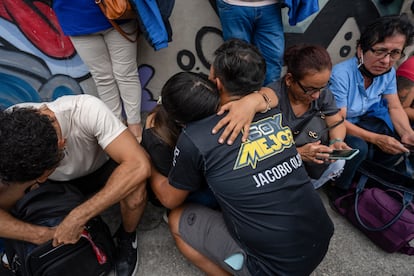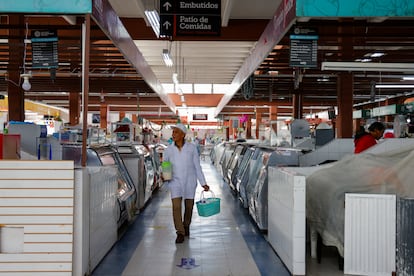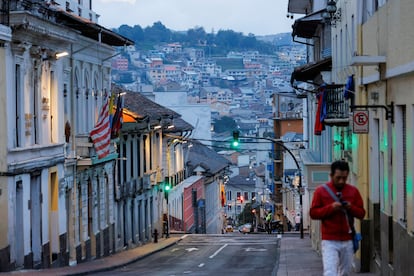Panic takes over in Ecuador: ‘I am terrified that they are going to recruit my son’
After the declaration of an ‘internal armed conflict’ by President Daniel Noboa, citizens are trying to carry on with their lives as best they can


From 5 p.m. on Tuesday to 8 a.m. on Wednesday, Quito, the capital of Ecuador, was deserted. As the sun began to rise, little by little the noise of cars, people passing by and a few open businesses began to ring out. The people who left their homes to go work repeated the same word: “fear.” After several days of escalating violence due to attacks by organized criminal groups, including the live kidnapping of journalists from the TC Televisión channel in Guayaquil, citizens were trying to resume their everyday activities amid strong feelings of uncertainty.
“I was panicking for my 23-year-old son,” said Luz, the owner of a grocery store, as she unloaded several buckets of eggs from her car. She was starting her day at 6 a.m. as usual, after having lost all her Tuesday sales. “We couldn’t sell, all the people started to go home in fear, they were evacuating the nearby shopping center and we didn’t know if it was a bomb or what was happening.” Luz declined to provide her last name over fears of the serious security crisis that the country is going through, with the highest number of violent deaths in the region: 40 homicides per 100,000 people. “My son leaves the restaurant where he works at 11 p.m. As a mother it is a terrible feeling, you can’t even sleep because you don’t know how your child is doing out there on the street,” says this 46-year-old woman who lives in Comité del Pueblo, an area in the northeast of the capital.

Christian Quiroz, 44, is a janitor at a building in the north of the city. As soon as he learned about the chain of attacks in several cities, he dropped everything and went back home. Quiroz, who lives in the southern neighborhood of Quito Sur, recalls that the subway was overcrowded and he had to practically force his way into one of the cars. But what worried him the most was walking down the street. “What crossed my mind is that some gang member or someone with weapons would show up and kidnap us,” he said, standing in the entrance to the building. When he got home, the streets were deserted.
For Luz, Tuesday afternoon in her neighborhood was “tremendous.” “The thugs showed up,” she said. Several neighbors told her that armed men entered two butcher shops. “We left the store at 5:30 p.m., and by the time we got home everything was closed, there was not a single store open.” Luz complained about the lack of police officers in her neighborhood, and she only felt calmer after her son walked in at 7 p.m. Hours earlier, President Daniel Noboa had declared an “internal armed conflict” and ordered the immediate deployment of security forces against organized crime. “We are at war,” he insisted on Wednesday.
Luz’s greatest fear, however, is that her son will be co-opted by one of the 22 organized criminal groups that Noboa’s government has now identified as terrorist gangs. “I’m terrified that they’re going to recruit him. They say they are recruiting young people. If I had the opportunity for my son to leave the country, I wouldn’t think twice. There is no security here, there is no future.”

A small line of taxi drivers were parked in front of a shopping center in the center of the capital. At the entrance, two private security guards checked the backpacks and bags of all the people going in. They say they were doing it as a preventive measure. Carlos, a 58-year-old taxi driver, said on Wednesday that he had no choice but to go out and work. He started at 9 a.m. “for safety,” even though his family had asked him to stay home.
“Debts don’t wait, you have to go make a living no matter what. You run a lot of risks,” he said, resting his arm on the window of his car. Carlos, who has worked as a taxi driver for 30 years, says the city has changed a lot, but nothing like what is happening right now. On Tuesday night, in his neighborhood of Guamaní, in the south, around 100 police officers patrolled the street for two hours. “With everything that’s going on, people have become destabilized.”
Sign up for our weekly newsletter to get more English-language news coverage from EL PAÍS USA Edition
Tu suscripción se está usando en otro dispositivo
¿Quieres añadir otro usuario a tu suscripción?
Si continúas leyendo en este dispositivo, no se podrá leer en el otro.
FlechaTu suscripción se está usando en otro dispositivo y solo puedes acceder a EL PAÍS desde un dispositivo a la vez.
Si quieres compartir tu cuenta, cambia tu suscripción a la modalidad Premium, así podrás añadir otro usuario. Cada uno accederá con su propia cuenta de email, lo que os permitirá personalizar vuestra experiencia en EL PAÍS.
¿Tienes una suscripción de empresa? Accede aquí para contratar más cuentas.
En el caso de no saber quién está usando tu cuenta, te recomendamos cambiar tu contraseña aquí.
Si decides continuar compartiendo tu cuenta, este mensaje se mostrará en tu dispositivo y en el de la otra persona que está usando tu cuenta de forma indefinida, afectando a tu experiencia de lectura. Puedes consultar aquí los términos y condiciones de la suscripción digital.








































